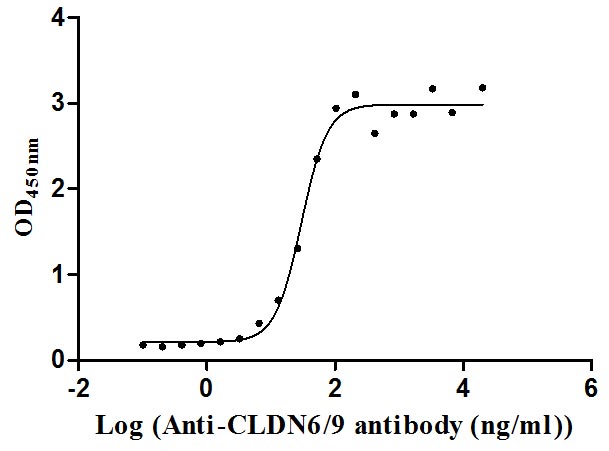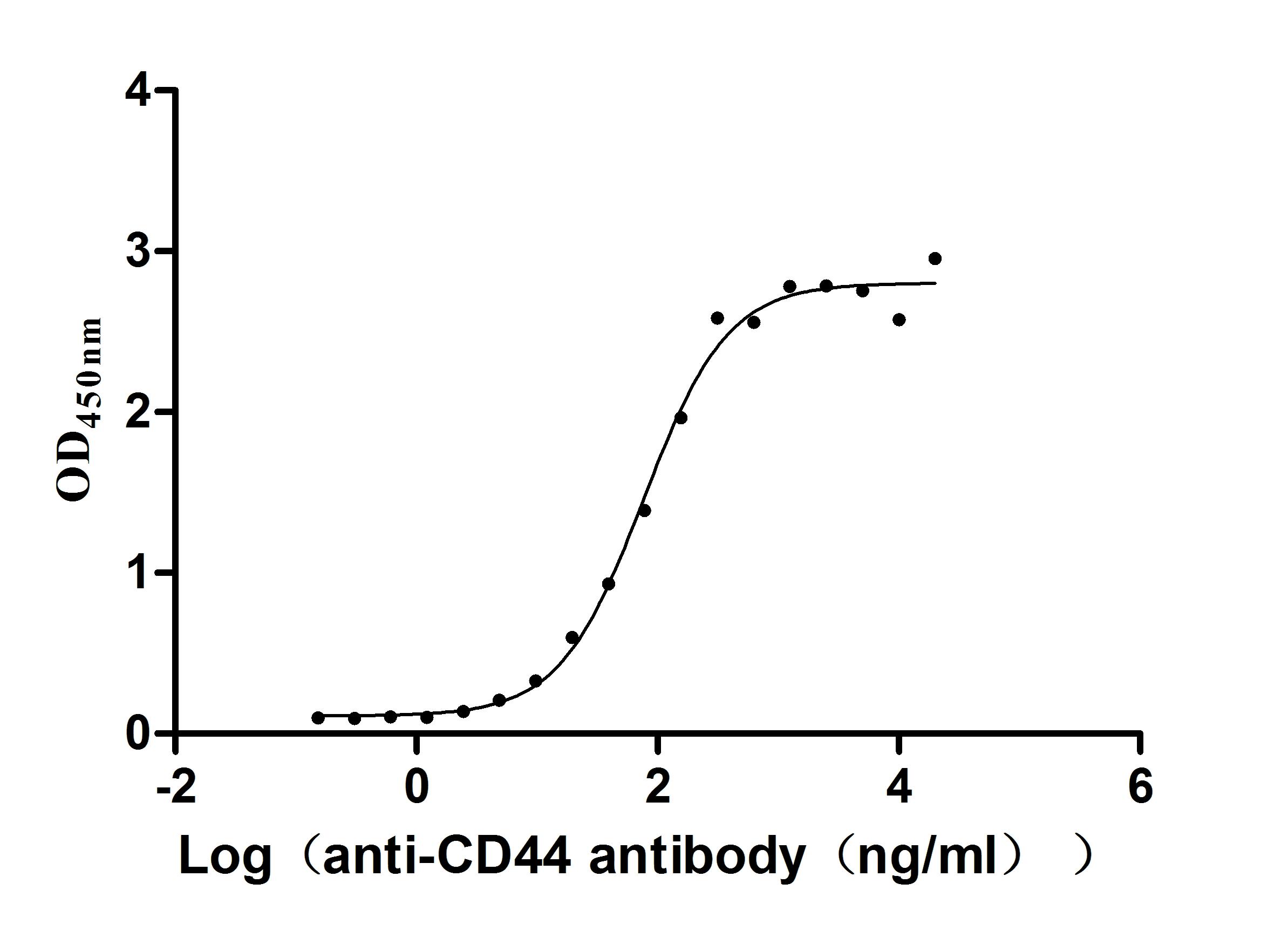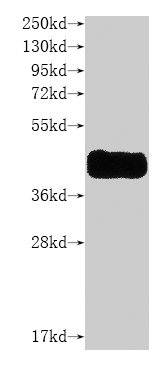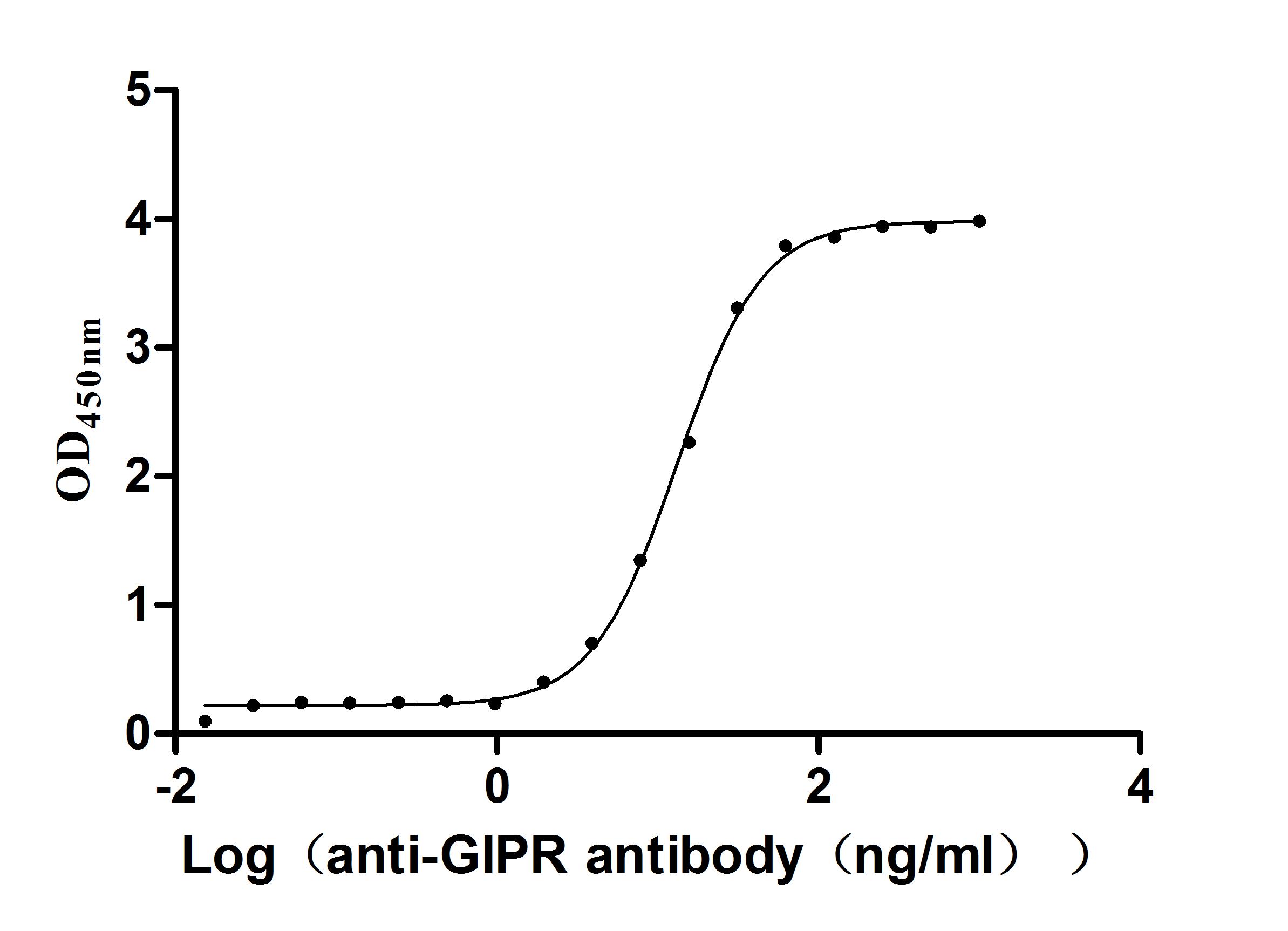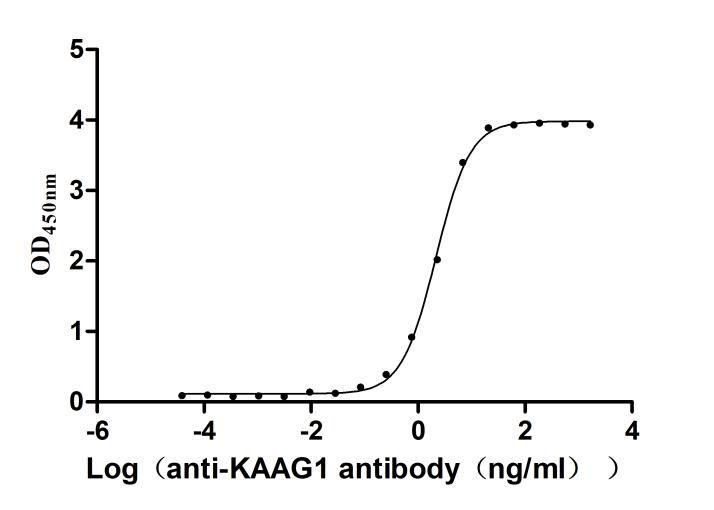Recombinant Human Major histocompatibility complex class I-related gene protein (MR1), partial
-
中文名称:人MR1重组蛋白
-
货号:CSB-YP853268HU
-
规格:
-
来源:Yeast
-
其他:
-
中文名称:人MR1重组蛋白
-
货号:CSB-EP853268HU
-
规格:
-
来源:E.coli
-
其他:
-
中文名称:人MR1重组蛋白
-
货号:CSB-EP853268HU-B
-
规格:
-
来源:E.coli
-
共轭:Avi-tag Biotinylated
E. coli biotin ligase (BirA) is highly specific in covalently attaching biotin to the 15 amino acid AviTag peptide. This recombinant protein was biotinylated in vivo by AviTag-BirA technology, which method is BriA catalyzes amide linkage between the biotin and the specific lysine of the AviTag.
-
其他:
-
中文名称:人MR1重组蛋白
-
货号:CSB-BP853268HU
-
规格:
-
来源:Baculovirus
-
其他:
-
中文名称:人MR1重组蛋白
-
货号:CSB-MP853268HU
-
规格:
-
来源:Mammalian cell
-
其他:
产品详情
-
纯度:>85% (SDS-PAGE)
-
基因名:MR1
-
Uniprot No.:
-
别名:Class I histocompatibility antigen like protein; Class I histocompatibility antigen-like protein; HLALS; HMR1_HUMAN; Major histocompatibility complex class I like sequence; Major histocompatibility complex class I related; Major histocompatibility complex class I related gene protein; Major histocompatibility complex class I related isoform CRA a; Major histocompatibility complex class I related isoform CRA c; Major histocompatibility complex class I related isoform CRA d; Major histocompatibility complex class I-related gene protein; MHC class I like antigen MR 1; MHC class I like antigen MR1; MHC class I related gene protein; MHC class I related protein 1 isoform B; MHC class I related protein 1 isoform C; MHC class I-related gene protein; MR 1; Mr1; Mr1 protein; MR1B; MR1C
-
种属:Homo sapiens (Human)
-
蛋白长度:Partial
-
蛋白标签:Tag type will be determined during the manufacturing process.
The tag type will be determined during production process. If you have specified tag type, please tell us and we will develop the specified tag preferentially. -
产品提供形式:Lyophilized powder
Note: We will preferentially ship the format that we have in stock, however, if you have any special requirement for the format, please remark your requirement when placing the order, we will prepare according to your demand. -
复溶:We recommend that this vial be briefly centrifuged prior to opening to bring the contents to the bottom. Please reconstitute protein in deionized sterile water to a concentration of 0.1-1.0 mg/mL.We recommend to add 5-50% of glycerol (final concentration) and aliquot for long-term storage at -20℃/-80℃. Our default final concentration of glycerol is 50%. Customers could use it as reference.
-
储存条件:Store at -20°C/-80°C upon receipt, aliquoting is necessary for mutiple use. Avoid repeated freeze-thaw cycles.
-
保质期:The shelf life is related to many factors, storage state, buffer ingredients, storage temperature and the stability of the protein itself.
Generally, the shelf life of liquid form is 6 months at -20°C/-80°C. The shelf life of lyophilized form is 12 months at -20°C/-80°C. -
货期:Delivery time may differ from different purchasing way or location, please kindly consult your local distributors for specific delivery time.Note: All of our proteins are default shipped with normal blue ice packs, if you request to ship with dry ice, please communicate with us in advance and extra fees will be charged.
-
注意事项:Repeated freezing and thawing is not recommended. Store working aliquots at 4°C for up to one week.
-
Datasheet :Please contact us to get it.
相关产品
靶点详情
-
功能:Antigen-presenting molecule specialized in displaying microbial pyrimidine-based metabolites to alpha-beta T cell receptors (TCR) on innate-type mucosal-associated invariant T (MAIT) cells. In complex with B2M preferentially presents riboflavin-derived metabolites to semi-invariant TRAV1-2 TCRs on MAIT cells, guiding immune surveillance of the microbial metabolome at mucosal epithelial barriers. Signature pyrimidine-based microbial antigens are generated via non-enzymatic condensation of metabolite intermediates of the riboflavin pathway with by-products arising from other metabolic pathways such as glycolysis. Typical potent antigenic metabolites are 5-(2-oxoethylideneamino)-6-D-ribitylaminouracil (5-OE-RU) and 5-(2-oxopropylideneamino)-6-D-ribitylaminouracil (5-OP-RU), products of condensation of 5-amino-6-D-ribityaminouracil (5-A-RU) with glyoxal or methylglyoxal by-products, respectively. May present microbial antigens to various TRAV1-2-negative MAIT cell subsets, providing for unique recognition of diverse microbes, including pathogens that do not synthesize riboflavin. Upon antigen recognition, elicits rapid innate-type MAIT cell activation to eliminate pathogenic microbes by directly killing infected cells. During T cell development, drives thymic selection and post-thymic terminal differentiation of MAIT cells in a process dependent on commensal microflora. Acts as an immune sensor of cancer cell metabolome. May present a tumor-specific or -associated metabolite essential for cancer cell survival to a pan-cancer TCR consisting of TRAV38.2-DV8*TRAJ31 alpha chain paired with a TRBV25.1*TRBJ2.3 beta chain on a non-MAIT CD8-positive T cell clone (MC.7.G5), triggering T cell-mediated killing of a wide range of cancer cell types.
-
基因功能参考文献:
- Human mucosal-associated invariant T cells possess capacity for B cell help via MR1-mediated immunoglobulins production. PMID: 28807929
- Early endosomal TLR9 activation is important for MR1-mediated bacterial antigen presentation in B cells. PMID: 28518215
- Polymorphism in MR1 gene is associated with susceptibility to tuberculosis. PMID: 27881839
- we have shown that MR1-mediated MAIT cell activation is tightly regulated at several levels. Efficient MR1-mediated MAIT cell activation requires both intact bacteria to access an acidified endolysomal compartment and activation of the APC through NF-kappaB or interferon signaling pathways. PMID: 27105778
- results suggest that high expression of MR-1 is involved in hepatocellular carcinoma progression PMID: 26823810
- Data show that the major histocompatibility complex, class I-related protein (MR1) antigen presentation is characterized by a rapid 'off-on-off' mechanism that is strictly dependent on antigen availability. PMID: 27043408
- endosome-mediated trafficking of MR1 allows for selective sampling of the intracellular environment PMID: 27031111
- Studies indicate that the antigen-presenting molecules CD1 and MHC class I-related protein (MR1) display lipids and small molecules to T cells. PMID: 26388332
- Data indicate that high expression of CD26 ia a specific markers to define major histocompatibility complex, class I-like sequence protein MR1-restricted mucosa-associated invariant T (MAIT) cells. PMID: 25752900
- Mucosal-associated invariant T cell adaptation was a direct consequence of exposure to various exogenous MR1-restricted epitopes. PMID: 25049333
- [review] Mucosal-associated invariant T-cell (MAIT) T-cell antigen receptor recognizes riboflavin and folic acid metabolites bound by MR1 in a conserved docking mode and thus acts like a pattern recognition receptor. PMID: 24556396
- MR1 tetramers allow precise phenotypic characterization of human and mouse mucosal-associated invariant T cells. PMID: 24101382
- A novel MR1B isoform probably plays a physiological role complementary to MR1A with respect to mucosal-associated invariant T cells development and/or function. PMID: 23457030
- Human thymic MR1-restricted MAIT cells are innate pathogen-reactive effectors that adapt following thymic egress. PMID: 22692454
- metabolites of vitamin B represent a class of antigen that are presented by MR1 for MAIT-cell immunosurveillance; as many vitamin biosynthetic pathways are unique to bacteria and yeast, data suggest that MAIT cells use these metabolites to detect microbial infection PMID: 23051753
- Mutagenesis of MR1 showed that only two residues, which were centrally positioned and on opposing sides of the antigen-binding cleft of MR1, were essential for MAIT cell activation PMID: 22412157
- Taken together these results strongly suggest that MR1 needs to bind proteasome-independent ligands in order to properly reach the cell surface. PMID: 21777569
- fact that MR1 seems mainly intracellular might offer clues as to the process, given the precedence in other class I molecules PMID: 21190736
- MR1 molecules can associate with the peptide-loading complex and can be detected at low levels at the surface of transfected cells. PMID: 12794138
- Our results demonstrated a preferential association of MR1 with beta(2)-microglobulin in MHC class I-deficient B cell lines. PMID: 18068122
- the presentation pathway of MR1 to MAIT cells is highly evolutionarily conserved PMID: 19416870
- Induction of MHC class I-like antigen is associated with relapsed chronic myeloid leukemia. PMID: 19706888
- a function for MR1 in the development of IgA producing plasma cells. PMID: 19760593
显示更多
收起更多
-
亚细胞定位:Cell membrane; Single-pass type I membrane protein. Endoplasmic reticulum membrane; Single-pass type I membrane protein. Golgi apparatus membrane; Single-pass type I membrane protein. Early endosome membrane; Single-pass type I membrane protein. Late endosome membrane; Single-pass type I membrane protein.; [Isoform 1]: Cell membrane; Single-pass type I membrane protein. Endoplasmic reticulum membrane; Single-pass membrane protein.; [Isoform 3]: Cell membrane; Single-pass type I membrane protein. Endoplasmic reticulum membrane; Single-pass membrane protein.; [Isoform 4]: Secreted.
-
蛋白家族:MHC class I family
-
组织特异性:Ubiquitous. Low expression is detected in peripheral blood B cells, T cells, monocytes and in bronchial epithelial cells (at protein level). Expressed in plasmablasts or plasma B cells in the lamina propria of ileum, appendix and colon (at protein level).
-
数据库链接:
HGNC: 4975
OMIM: 600764
KEGG: hsa:3140
STRING: 9606.ENSP00000356552
UniGene: Hs.13500
Most popular with customers
-
Recombinant Human Claudin-9 (CLDN9)-VLPs (Active)
Express system: Mammalian cell
Species: Homo sapiens (Human)
-
Recombinant Macaca fascicularis CD44 antigen (CD44), partial (Active)
Express system: Mammalian cell
Species: Macaca fascicularis (Crab-eating macaque) (Cynomolgus monkey)
-
Recombinant Human C-C chemokine receptor type 8 (CCR8)-VLPs (Active)
Express system: Mammalian cell
Species: Homo sapiens (Human)
-
Recombinant Macaca fascicularis CUB domain containing protein 1 (CDCP1), partial (Active)
Express system: Mammalian cell
Species: Macaca fascicularis (Crab-eating macaque) (Cynomolgus monkey)
-
Recombinant Macaca fascicularis Gastric inhibitory polypeptide receptor (GIPR), partial (Active)
Express system: yeast
Species: Macaca fascicularis (Crab-eating macaque) (Cynomolgus monkey)
-
Recombinant Human Kidney-associated antigen 1(KAAG1) (Active)
Express system: E.coli
Species: Homo sapiens (Human)


